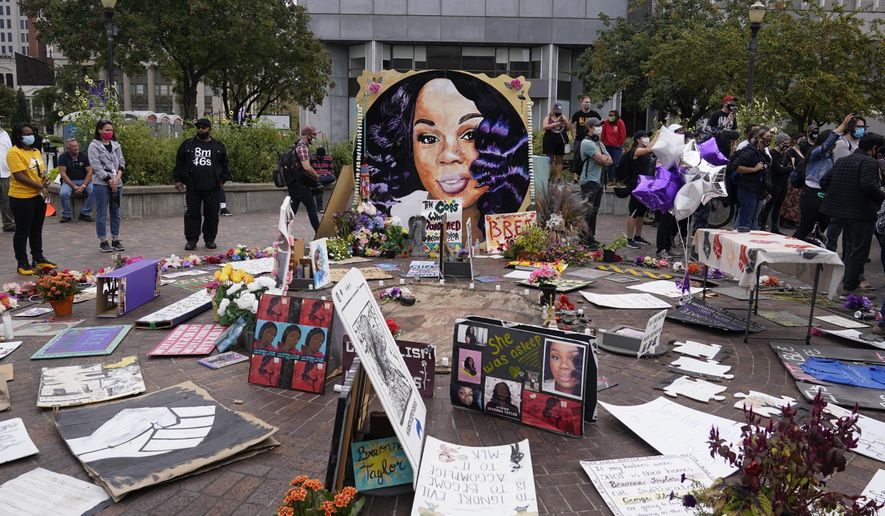LOUISVILLE, Ky. (AP) - Protesting has long been as American as apple pie, with one of the primary ways of amplifying a protest’s message and movement coming through music.
Think Bob Dylan’s “Hurricane,” Creedence Clearwater Revival’s “Fortunate Son,” Rage Against The Machine’s “Killing In The Name” or countless others throughout time.
Now Lexington-based social activist and hip-hop artist Richard Spaulding, better known through his alias Devine Carama, is doing the same, focusing on Breonna Taylor, fatally shot in her apartment in March by Louisville police.
‘Rubber stamp?’ Lexington council votes to adjust police disciplinary procedures
On July 19, Carama kicked off “16 Bars For Breonna” on his SoundCloud page with the intent of releasing a new verse or song each day about Taylor’s case until she receives justice.
However, after jumping into it Carama quickly realized that he needed to expand his creative limits on the project, not just focusing on Breonna Taylor’s case but also the myriad of other systemic issues facing Black Americans such as gentrification, red-lining and health disparities, under a microscope recently due to COVID-19 and its adverse effects on the black population, including Carama’s own brother and cousin.
“As I started to delve into it I realized that I didn’t just want these songs and verses to be about Breonna because there’s only so much I can say about a person I’ve never met,” said Carama. “So I chose to make each verse and song not only about her but also something that had to do with systemic racism and oppression on a larger scale.”
For Carama, Taylor’s case also hit home extra hard due to him being the father of four girls, one of which he lost this past April in a fatal car crash. Taylor’s death felt like a gut punch for Carama as he stood in downtown Louisville with countless others on Sept. 23 hearing the grand jury results being read aloud. No officers were indicted in Taylor’s death directly; instead, one officer was indicted for shots into other apartments.
Channeling emotions from his own recent loss, Carama began to imagine how he would react if what had happened to Taylor had happened to one of his own daughters. The same empathy that left Carama outraged is what he hopes those who listen to “16 Bars For Breonna” will take away from the experience.
“(The Breonna Taylor grand jury results ) just highlighted everything we’re fighting for when it comes to systemic racism and the unprotective way that we handle black women in America,” said Carama. “The grand jurors speaking out since the verdict only adds to the controversy, speculation and doubt surrounding Breonna Taylor’s case.”
From the start, the project faced confrontational issues head on, trying to use empathy as a tool to place people with perspectives and life experiences different from his own into a similar situation in hopes of getting them to understand his own outrage.
The first song, aptly titled “16 Bars For Breonna,” wastes no time mincing words about the disparities in America when it comes to justice for blacks and whites as Carama says “Imagine if Breonna Taylor was Kylie Jenner or Calipari’s daughter / Think officers would be suspended? / Nah each one would be hand-cuffed and arrested.”
Other songs hit home with the emotional vulnerability they elicit, with “I Did Everything Right” running through how many Black Americans are told to live straight and narrow lives and listen to the police, only to end up in body bags regardless like Taylor, their life (and the song) ending in a series of abrupt and poignant gunshots.
“Children Of The Ghetto” begins with a young Black American crying because he shouldn’t have to protest to obtain equal rights.
Other issues discussed throughout the 50 songs include gentrification, red-lining, white fragility, voter suppression, the evolution of the black women through slavery, Jim Crow and the civil rights movement to present day and even local issues like whether Rupp Arena should be renamed.
“I want to pull on some heart strings and use my artistry to get people to think, second-guess themselves and maybe wander outside of their ideologies or political circle to hear the pain and truths within the music to get a better understanding for where our unrest is coming from,” said Carama. “I want listeners to be placed in our community’s position and think ‘What if that was my daughter? What if that was my sister? What if that was my niece?’ ”
Carama says he was constantly taking notes on ideas and inspiration for the project as he wrote new music for “16 Bars For Breonna” daily. Each of the songs were recorded and produced in batches of five to seven at a time in Lexington at the home studio of friend and long-time collaborator Jaysyn Wyche, also known as JK-47.
Carama also collaborated with California-based producer Soulistic Beats for several songs on the project along with Portland, Oregon-based Lexington transplant LuvJonez Music. Per Carama, the fast pace at which he had to write these songs and bring them to life has been one of the most pressure-packed scenarios he’s worked through as an artist.
With the upcoming election, Carama intends to repurpose around 15 songs produced by LuvJonez Music from “16 Bars For Breonna” into a new album and video project titled “Black Men In America” to be released in mid-October that will focus on social injustice, racial equity and what he and other Black men can do to further engage with their communities and political systems to fight systemic racism and oppression.




Please read our comment policy before commenting.